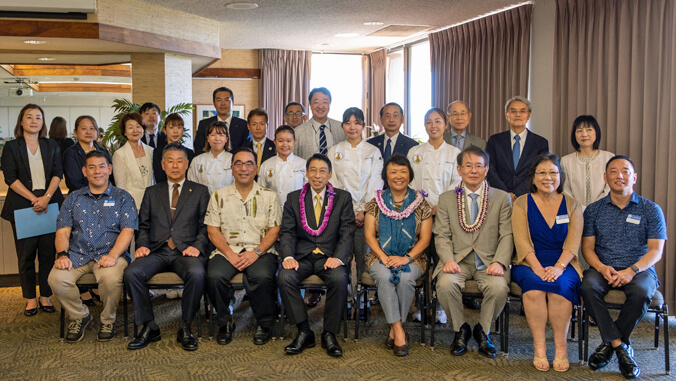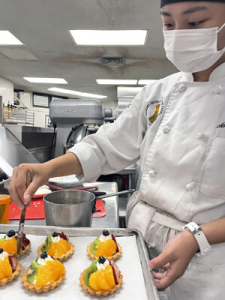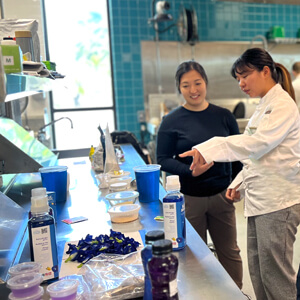
Kapiʻolani Community College welcomed the governor of Japan’s Fukuoka Prefecture, Seitaro Hattori, to the campus in late April. The successes of an exchange partnership between Kapiʻolani CC’s culinary arts program, Paul S. Honda International Center and Nakamura Gakuen University (NGU) to mutually broaden the academic and cultural experiences of students from both institutions piqued the interest of Fukuoka government officials and sparked enthusiasm for the visit.

“We believe that it will be wonderful if this exchange can lead to the development of professionals who can play an active role internationally and to the global dissemination of each other’s culture,” said Hattori. “Both Fukuoka andHawaiʻi share a common connection, and like here and your beautiful ocean, Fukuoka is also blessed with beautiful nature and seas that create the waters surrounding us. We, in Fukuoka, are blessed with abundant nature, agriculture, forestry and fish products from the sea and mountains. We hope that students from the University ofHawaiʻi will encounter many programs in Fukuoka.”
The collaboration also opens opportunities to have a profound long-term impact.
“We often learn about ourselves and our home by going abroad,” said Kapiʻolani CC Chancellor Misaki Takabayashi. “The transformation that we go through when we are exposed to completely new and foreign experiences has powerful life-long impacts. This is why the governments on both sides are committed to supporting the exchange between NGU and Kapiʻolani CC, and Fukuoka andHawaiʻi. My hope is that by expanding these opportunities, our students will nurture a strong identity and sense of kuleana (responsibiity) as global citizens and representatives ofHawaiʻi.”
Spring break in Fukuoka
Kapiʻolani CC culinary art students spent their spring break traveling and learning in Fukuoka. For many, it was their first time traveling internationally. Within a week, students experienced cultural activities, cooking demonstrations, culinary lectures and industry site visits.
“Having the opportunity to visit Fukuoka was an incredible experience,” said Kapiʻolani CC culinary student Sheena Llorico. “It was amazing getting to learn about the production of rice, and making our own mentaiko (salted cod roe). We even partook in classes taught by one of NGU‘s wonderful professors, where we learned about the variety of rice and the process to make one of Fukuoka’s known dishes, Motsunabe. What I’m most grateful for is being able to learn more about Japan’s culture and the friends I’ve made with the group I went up with, as well as the NGU students who were so kind to us.”
Kapiʻolani CC students will return to Fukuoka for another short-term study abroad experience in summer 2023 to gain new perspectives, learn new techniques in Fukuoka regional cuisine, and participate in culturally relevant opportunities that prepare them for their careers.
Dual degree at Kapiʻolani CC
Through the institutional partnership, students from NGU also have had the opportunity to enter a dual-degree program with Kapiʻolani CC since 2016.

Upon graduation, the students from Fukuoka receive a bachelor of arts or science degree from NGU and an associate of science degree from Kapiʻolani CC in culinary arts. The Fukuoka students graduating in spring 2023 experienced everything from voluntary work for the Sony OpenHawaiʻi banquet, paid internships with local restaurants, coffee sensory training, food innovation, product development and local farm and food manufacturer visits.
“The valuable experiences and the many people I met at Kapiʻolani CC broadened my horizons,” said Kapiʻolani CC culinary (and NGU) student Akari Takigawa. “In the future, I’d like to work in the food industry to connect Japan and overseas, especially to my hometown, Fukuoka.”

